Despite all I've read regarding how to sharpen a scraper I just dont seem to get it right.One thing I do know is that a properly sharpened scraper is an amazing tool for levelling and is better than any sandpaper I have tried so far. I even purchased a burnisher thinking maybe that was what I was doing wrong but still cannot get a proper edge that will scrape of an even shaving and all i get is dust usually.
I followed the usual instructions --rub the scraper edge on a flat file-- forward strokes-- about 4 or 5 times and then use the burnisher . maybe I am using the wrong type file --I dont know but its frustrating to say the least.
Anyone got a link or some advise on how this should be done correctly. Its sounds like a simple task but not for me unfortunately
Thanks guys--by the way, we have a heat wave in ireland right now--not a very common thing in this country but very welcome .
Rusty
Scraper blade
-
Dave Bagwill
- Posts: 5955
- Joined: Tue Dec 13, 2011 7:44 pm
Re: Sharpening a Scraper
This is all you need. Ken posted this some time ago and the method works.
http://www.acousticguitarconstructionfo ... aper#p7442
I've never heard anyone be thankful for a heat wave! :-)
http://www.acousticguitarconstructionfo ... aper#p7442
I've never heard anyone be thankful for a heat wave! :-)
-Under permanent construction
Re: Scraper blade
In ireland if it's not raining then it's called a heatwave:)
Re: Scraper blade
Don't despair Rusty, like everything else it takes some practice to get it right, and visualizing what you are trying to achieve is important. The video Dave linked to is very good. If you want another demonstration, look at this one too. http://www.thewoodwhisperer.com/videos/ ... raping-by/
One step in the process that I do after using a flat file is to rub the edge on a 800 waterstone to ensure that the edge is fairly smooth. A file can square up the edge but it will leave a pretty rough surface (at high magnification).
Lee Valley has this set of instructions too. http://www.leevalley.com/en/shopping/In ... px?p=41634
One step in the process that I do after using a flat file is to rub the edge on a 800 waterstone to ensure that the edge is fairly smooth. A file can square up the edge but it will leave a pretty rough surface (at high magnification).
Lee Valley has this set of instructions too. http://www.leevalley.com/en/shopping/In ... px?p=41634
-
John Parchem
- Posts: 2784
- Joined: Fri Dec 23, 2011 8:33 pm
- Location: Seattle
- Contact:
Re: Scraper blade
In the August 2012 edition of fine woodworking there was an article "Foolproof way to sharpen a scraper." The method used was much like shown in the video that Ken posted. The method included a very simple jig that literally took me 30 seconds to make including travel time to my band saw.
I usually just file the edge and used a burnisher. That was always great for cleaning bindings, purflings or braces but this time I need to remove .010" from the sides where a Florentine cutaway needed to bend. As this was figured koa I needed a real edge.
The jig is just a 8 inch block with a 7 inch band saw kerf. They suggested a 1 3/4 inch square by 8 inch block. I just grabbed some wood sitting on the band saw table. I used it the first to allow me to polish the sides. Then with a tiny bit of scraper showing I filed it until I got clean soft steel. It acts as a guide to assure that I file straight. Then I used it to hold the scrapper square while I polish the edge.
polish the sides
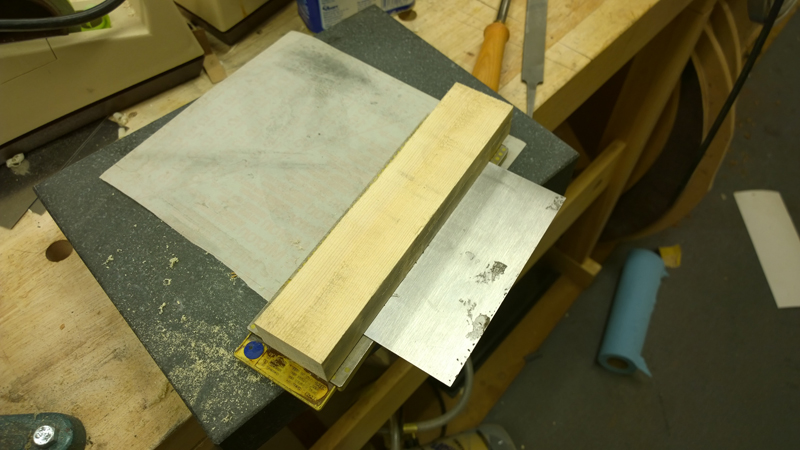
File to clean new steel
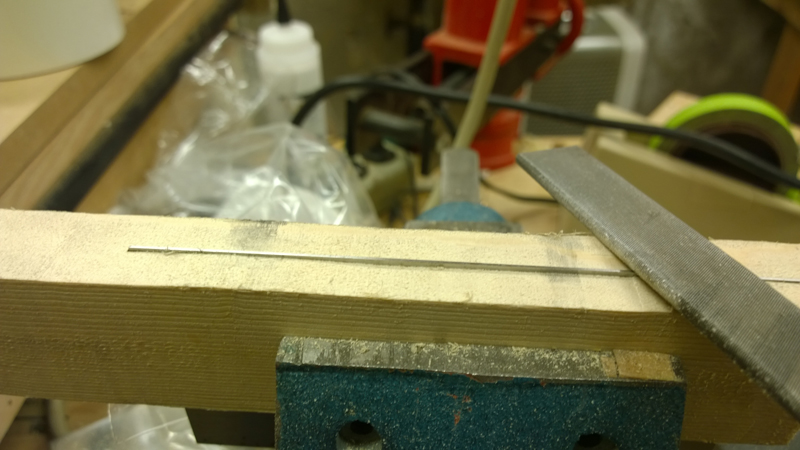
polish the edge.
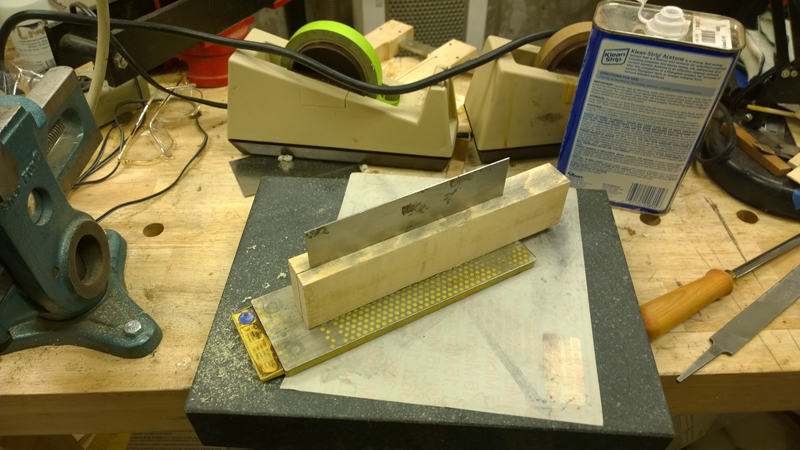
No shown is that I clean the burr off like shown in the first picture.
Here is one difference from the video. They suggest drawing the burr out from the side not the edge as shown in the video.
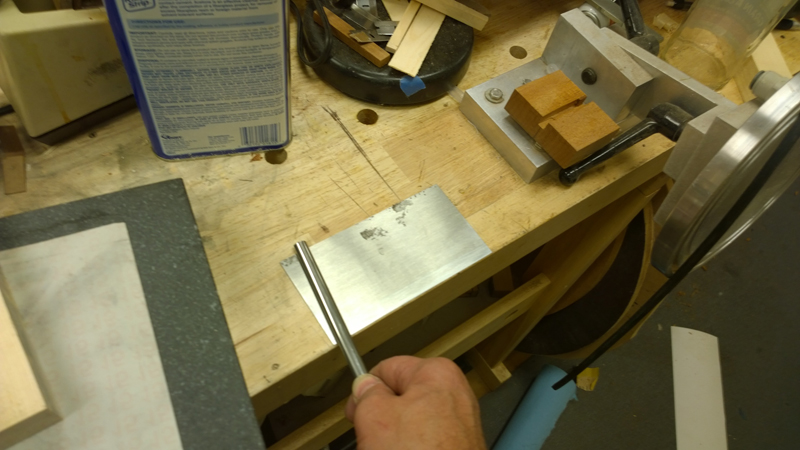
Turn the burr
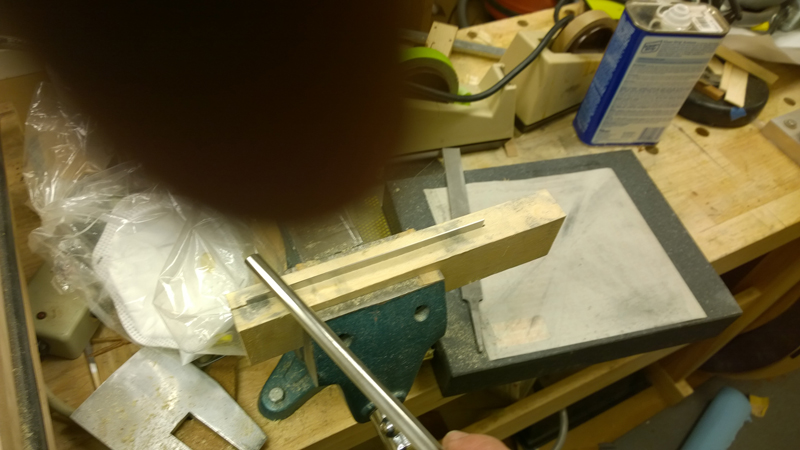
I learned from the article that it does not take a lot of pressure to turn the burr. The edge is so small that any force is huge on the edge.
The scrapper performed well.
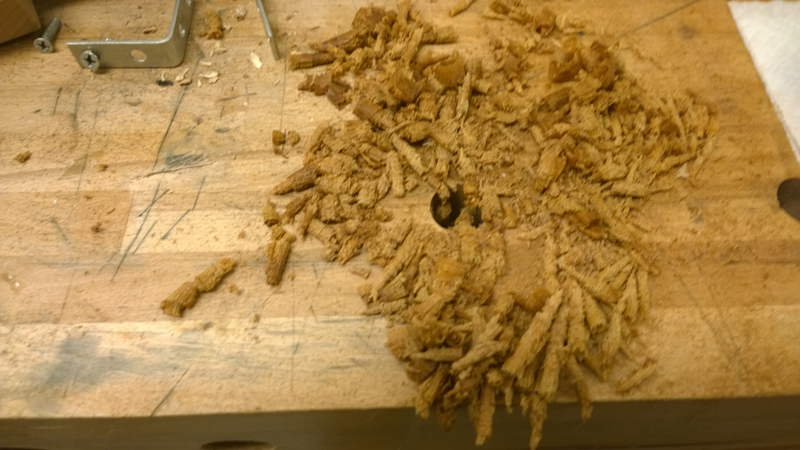
I usually just file the edge and used a burnisher. That was always great for cleaning bindings, purflings or braces but this time I need to remove .010" from the sides where a Florentine cutaway needed to bend. As this was figured koa I needed a real edge.
The jig is just a 8 inch block with a 7 inch band saw kerf. They suggested a 1 3/4 inch square by 8 inch block. I just grabbed some wood sitting on the band saw table. I used it the first to allow me to polish the sides. Then with a tiny bit of scraper showing I filed it until I got clean soft steel. It acts as a guide to assure that I file straight. Then I used it to hold the scrapper square while I polish the edge.
polish the sides

File to clean new steel

polish the edge.

No shown is that I clean the burr off like shown in the first picture.
Here is one difference from the video. They suggest drawing the burr out from the side not the edge as shown in the video.

Turn the burr

I learned from the article that it does not take a lot of pressure to turn the burr. The edge is so small that any force is huge on the edge.
The scrapper performed well.

Re: Scraper blade
I use almost the exact same method as John (johnparchem) - my jig isn't as deep, but has the same function. Using a fine stone to smooth both the sides and the edge appears to be a key step in getting a sharp and stable edge.
This is one case where practice really perfects your process. I've sharpened my scrapers 20-30 times and am finally getting a feel for it. In another year I may actually know what I'm doing.
The other side of this is getting the feel for using a sharp scraper - experiment with the angle and deflection. I've found, with the way I sharpen, that the scraper needs to be much closer to 90 degrees to the surface when scraping than I first thought. Your burnishing angle effects the scraping angle.
This is one case where practice really perfects your process. I've sharpened my scrapers 20-30 times and am finally getting a feel for it. In another year I may actually know what I'm doing.
The other side of this is getting the feel for using a sharp scraper - experiment with the angle and deflection. I've found, with the way I sharpen, that the scraper needs to be much closer to 90 degrees to the surface when scraping than I first thought. Your burnishing angle effects the scraping angle.
Re: Scraper blade
I learn so much on this forum. I don't even own a real scraper. However,I do have a story concerning a scraper. I purchased a thickness planer from a buddy. He said I would have to put new blades in it. Now a new one runs 400 bucks and more. So I said ok I'll give you two hundred and we'll subtract the cost of the blades. He was happy so I ordered new blades he installed them and delivered it to my house. When we put it into my shop he handed me a plastic container with the old blades in them. He said here these make super scrapers. Man was he ever right. They take off a lot if you bear down or little bitty curls if you want. Just my .02
